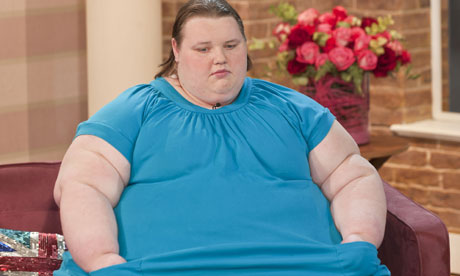
Chloe Memisevic, at 18, is making a name for herself. Inside the fashion industry, she's the next big thing, striding down the most cutting-edge of catwalks. Outside the fashion industry, she is paraded as an example of the wasted, bones-only aesthetic that the mavens cannot resist.
Georgia Davis, at 17, gets more fleeting, less lucrative attention. At 40 stone, she is Britain's fattest teenager. With support, in 2009, she lost 14 stone. But she has since put that weight back on, and more. Her predicament attracts occasional media attention, but no one wants to employ Davis to flog anything. Thin is rewarded, fat is reviled, at all levels. "Eating disorder" denotes a private tragedy, of well-intentioned dieting taken beyond extremes. Davis clearly has an eating disorder too, but one that is most commonly referred to in public, collective terms. She is an extreme victim of the "obesity epidemic". Eating disorders that cause the flesh to melt and dis-appear have a glamorous, individualistic image, with its poster girls, models and actresses, and even its critics, beautifully groomed. Eating disorders that make people fat – they're just sad and a bit funny, serious because of the harm they do to others in the form of giant, flabby health service bills.
Broadly, the rich are too thin and the poor are too fat.
There's no more visceral critique of the workings of class in consumer society than Memisevic's body compared to Davis's. When even the symptoms of obsessive compulsive disorders in very young adults are treated differently, depending on whether they have economic value, then the whole culture has gone mad.
Unfortunately, however, as an editorial in the Lancet confirms, physical and mental symptoms are hard to separate. New research has found that anti-psychotic drugs tend to trigger obesity and heart disease. Previously, it was acknowledged that mental health patients were more likely to have such troubles, but it was argued that this was due only to more general environmental factors.
Most people who have had experience of treating psychosis with drugs will understand that it can be frustrating when loved ones refuse to take their medication, and set back their recovery. Now it's proven that the awful symptoms that patients report are all too true, and all too physically debilitating.
It is still much better that these drugs are available, because they can and do help people to reclaim their lives. But the physical side effects of these medicines must be properly treated too. Many people struggling to stay on medication because of highly unwelcome side-effects will be cheered by this news.

